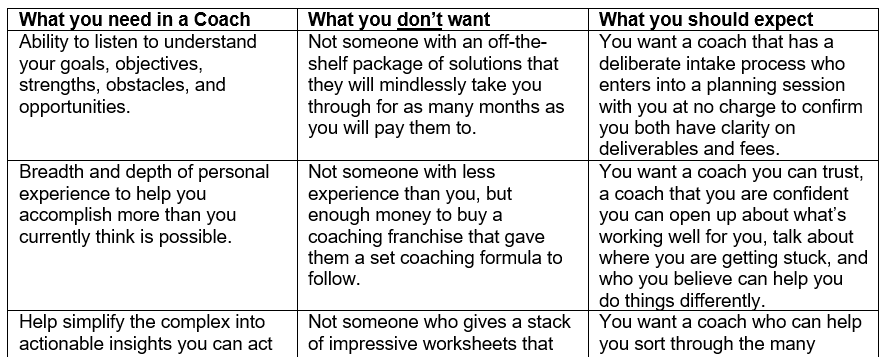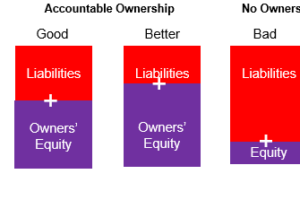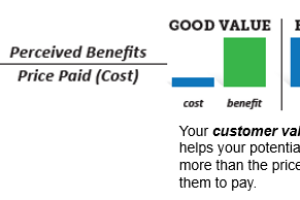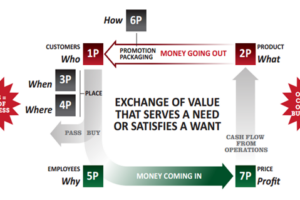
Synopsis
A business coach is like a personal trainer who assesses both your core strength and your willingness to make needed changes to realize better results. The goal of the coach is to help you to form new habits, free yourself from what’s holding you back to help propel your energies in ways you never thought possible.
Most entrepreneurs start their businesses to achieve personal freedom, whether that’s financial freedom or the freedom to control what they do and how they use their time.
Once on the path of business ownership, every business owner eventually realizes that there is something bigger at play than running their business. Something is missing, something that is beyond the obvious measures of business success. All they can recognize is that what they are doing isn’t working, no matter how much personal discipline and sacrifice they are expending.
The path to success can be daunting and is certainly different for everyone. This is why many smart business owners seek out the assistance of a business coach to help them achieve better results with less effort over time through greater personal discipline.
Great athletes are quick to credit their coaches for instilling the discipline necessary to achieve a goal, offering helpful tips to sharpen their skills while providing encouragement during difficult times. Likewise, an entrepreneur can benefit from the wisdom and insights of an experienced business coach.
A business coach is like a personal trainer who assesses both your core strength and your willingness to make needed changes to realize better results. The goal of the coach is to help you to form new habits, free yourself from what’s holding you back to help propel your energies in ways you never thought possible.
While business owners will count on friends and family members for many things, one thing they can’t reasonably expect is honest criticism to be among them. Your business coach should be fair, reasonable, and interested in your success, as well as willing to tell the truth, even if it’s not what you want to hear.
Don’t mold your life around your business. Mold your business around your life. The difficult question you must ask yourself is, who’s in control, me or my business? The likely answer is “my business,” and this is why exploring the services and support of a professional coach can change the quality of your life and the profitability of your business.
Your failure to be the one in control of your business is like breaking free from someone else’s prison when you were their employee into your own prison of your own making resulting in more misery than expected.
Every entrepreneur is pulled simultaneously in too many different directions that it becomes difficult to take the time to step back and reflect in deliberate ways. This leads to building a business that isn’t in alignment with the life you want, isn’t suited to your unique strengths, and isn’t meaningful to you, those you love, your employees, or your customers. If this is your experience, a quality coach will help you correct this.
The best coaches will start out playing to a person’s strengths. This includes an awareness of weaknesses yet focuses on strengths. When a business owner builds on their strengths, they are better able to leverage the talent that comes naturally to them. This is how they realize their best performance. In contrast, coaches who focus on weaknesses to be overcome end up weighing down their client and their business as they try to do things that don’t come naturally to them.
Unfortunately, business coaches are like real estate agents. You can find them anywhere, and there are thousands to choose from. The difference is, that the State licenses a real estate agent who then works for a licensed broker whereas coaching is a profession that remains unregulated. This means you’ll find all different types of people calling themselves coaches, each with their own process and methodology.
Even more unfortunate, there are a lot of bad coaches out there. This is because the barrier to entry for a business coach is so low. Anyone can call themselves a business coach, whether they have actual business experience or not. So how do you know which coach is best positioned to help you? How do you know who to use or trust?
As you consider who to engage as a coach consider the following core capabilities and skills that the most effective coaches all have:
| What you need in a Coach | What you don’t want | What you should expect |
| Ability to listen to understand your goals, objectives, strengths, obstacles, and opportunities. | Not someone with an off-the-shelf package of solutions that they will mindlessly take you through for as many months as you will pay them to. | You want a coach that has a deliberate intake process who enters into a planning session with you at no charge to confirm you both have clarity on deliverables and fees. |
| Breadth and depth of personal experience to help you accomplish more than you currently think is possible. | Not someone with less experience than you, but enough money to buy a coaching franchise that gave them a set coaching formula to follow. | You want a coach you can trust, a coach that you are confident you can open up about what’s working well for you, talk about where you are getting stuck and who you believe can help you do things differently. |
| Help simplify the complex into actionable insights you can act on through an ability to help you quickly apply mental models and frameworks that make hard decisions easier to make. | Not someone who gives a stack of impressive worksheets that they leave you to figure out before you meet again. When you do meet again, they don’t even discuss your output because they are excited about the next stack they are leaving. | You want a coach who can help you sort through the relevant many things you could and should be doing to help you focus on the critical things you need to get done by your next conversation
|
| Shared confidence that your coach can be a trusted adviser for you and that they believe they can help you. It’s your life to live not the coaches, so find a coach who can guide you to making better decisions. | A dominant coach who pushes their agenda because they know what’s best after a few conversations vs. helping you discover what’s holding you back from your goals and aspirations. | You want a coach who is more interested in helping you get to where you want to go than they are in collecting their next coaching fee. Someone who only stays with you if you are getting back more value from them than it costs you. |
| Ability to persuade and influence decisions. While the decisions you make are yours to make, you want a coach who will instill in you the courage and confidence to do the difficult things. They do this best when they help you define your future and help you walk a better path to realizing your goals and aspirations. | You don’t want someone who doesn’t have much more to offer you in their second or third meeting than they did in their first. You also don’t want to pay money to a person who will intimidate you into following his or her advice.
|
Sustained change can be difficult. You hire a coach to help you see what you’re not seeing, and show you a better way while helping you remain accountable for making the changes you know you need to make to produce better results. Sustained change can be difficult. |
Seven ways to make sure you identify the best coach for you:
- Thought Leadership. Most quality coaches are also writers and/or speakers on business topics. Check out their body of work to appreciate where their passion and expertise has taken them. It will tell you a lot about their style, personality, and philosophy. The caution here is just because someone is great at teaching, executing, or creating new ideas does not mean they’re also a great coach. Great coaches will also have an accreditation from either the Worldwide Association of Business Coaches (WABC) or the International Coach Federation (ICF).
- Someone who owned their own business. Regardless of size, industry, or value, at least 80% of businesses face the same challenges. Experienced business owners, with any degree of success, have already overcome the bulk of the challenges you face everyday. Their first-hand experience is likely to hold the answers to any pressing issues. Look at their resume to see what they have done over their career and who they have worked for. Confirm whether they have owned any other business besides their coaching business? Appreciate how long have they been a small business coach or consultant? Identify how many clients they have worked with and in what industries? Your goal is to find someone with a wide breadth of experience so you know they can handle your unique situation.
- More than coaching is available.In addition to business coaching, do they offer other products and services, like consulting, books, audio programs, and classes?
- Talk to who you will work with not just those selling the coaching plan. You want to know exactly who you will be working with so you don’t end up with a coach whom you’ve never spoken to and who you don’t know their skills, knowledge, and experience. Will you work directly with the main coach in the business, or are there a team of coaches who work for or subcontract for the main coach? If the person conducting the planning session isn’t the person who will be coaching, you then walk away. They sent in their closer to get you excited to sign you up and will be sending in the junior talent to do the work. These types of arrangements never work.
- Complimentary planning session. Don’t pay for a coach until you have experienced their coaching through a planning session that comes out of the interview phase. Why? Because there’s something even more important than referrals, testimonials, and thought leadership: FIT. Coaching is, at it’s core, a partnership. As the coach, I am gauging your emotional intelligence, experience, commitment and communication levels you seek. While you are determining if I am someone you think could help you and you are someone I think I can help. A coaching plan that we both believe in will confirm our FIT to work together.
- Referrals and testimonials align with what you are experiencing. Referrals and testimonials are like gold in the coaching world. Questions to ask, Is this person used to coaching others with your background and goals? Have they gotten results for their clients similar to the ones you want to achieve?
- STOP if you’re not feeling a good fit. After your initial consultation, do you feel that it’s a good fit, personality-wise? Do you feel positive after speaking with them, or dragged down? If you are an energetic person and the coach is quiet (or vice versa), is that a good match? Do you feel you can trust the coach and have a good rapport with him/her? Do you enjoy their company? Do you see yourself wanting to spend a lot of time together? If yes to this and the questions above then congratulations, you have found your coach.
As you progress through these seven identifiers pay attention to the quality of fit, style, and philosophy with you throughout your due diligence work.
In the end, the number one factor to consider when choosing a business coach is anchored by your connection to their coaching style and philosophy. Not every style works for every business owner or every business. A close runner-up includes their areas of expertise, their character, and how much you feel you can trust them to do what they say they will do.
Go to What to expect when hiring a coach? or go to business-cpr.com/coach to make your introductory coaching request.
Do what the pros do.
Are ready to free yourself from what’s holding you back, form new habits, and get help propelling your energies in ways you never thought possible. Just like professional athletes work with coaches to improve themselves. Click the link below to speak with a certified BusinessCPR™ Coach to learn how we can help.
TALK TO A COACH

